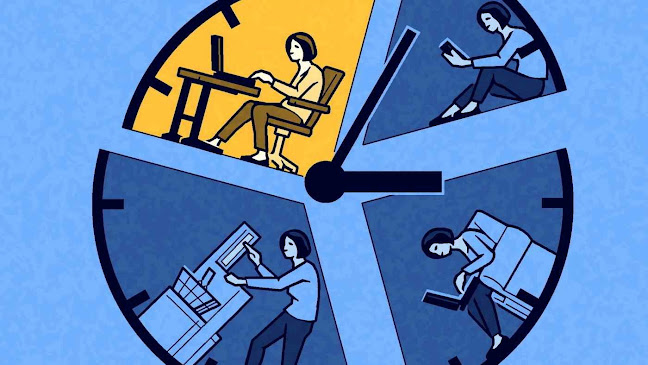The real cost of shadow work
Calculating its full economic impact could help us understand productivity and employment issues
Rana Foroohar
One of the great economic mysteries of the moment is why worker productivity, particularly in the US, is falling.
Some economists say that it’s simply a correction from the unsustainably hard work that many of us did during the Covid-19 pandemic.
But there was a productivity dip after the Great Recession, as well.
And while there are certainly big long-term factors at play here, such as the failure of education to keep up with technology (which in turn reduces productivity) I think there are other, under-explored issues.
These include the rise of shadow work.
Shadow work is a term that was coined by the Austrian philosopher and social critic Ivan Illich in 1981.
For him, it included all the unpaid work done in economies, such as mothering and housekeeping.
But more recently, the term has expanded to include the work that companies have been able to turn over to their own customers, via technology.
In the 2015 book Shadow Work: The Unpaid, Unseen Jobs That Fill Your Day, former Harvard magazine editor Craig Lambert focused on the myriad tasks that used to be done by other people, which most of us now do for ourselves, usually with the help of digital devices.
This includes everything from banking to travel bookings, ordering food in restaurants to bagging groceries, not to mention downloading and navigating the apps we need to pay parking tickets or track our children’s school assignments or even troubleshoot our own tech problems.
While neither Lambert nor groups like the IMF Statistical Agency have a good estimate of the total amount of extra work represented by such tasks, it’s clearly substantial, and growing, particular if you consider research showing that a quarter of all jobs in the US will be severely disrupted by automation by 2030 (indeed most jobs will experience some level of disruption).
“I’m just amazed how we’ve been suckered into spending our own time straightening out things that other people used to do for us,” says Lambert.
In one recent and not unusual week, I downloaded and used several new apps on my phone, in order to do things like pay college prep tutors, book classes and manage an overseas vacation.
Then there was the uniquely American hell of healthcare shadow work.
This included inputting medical information for providers, filing insurance claims for multiple family members, and the effort of trying to get reimbursed or correct the frequent mistakes that pop up in a highly fragmented and complex system in which various entities are all trying to push costs on to each other.
I lost a couple of hours trying to resolve (unsuccessfully) an order issue with a department store, moving from multiple help emails to chatbots to overseas call centre conversations, which promised to fix things but didn’t.
I eventually turned the matter over to my credit card company, Visa, which then in turn called for additional inputting of digital information by me.
A business trip required the use of an unfamiliar travel platform, which required time and effort to learn.
I scanned my own lunch items into a kiosk at the airport, which asked me if I wanted to leave a tip (to myself?).
When the flight was delayed, I sat in a coffee shop where orders had to be placed via an iPad.
After 30 minutes of waiting for a latte, I looked around for help but couldn’t find a human being to complain to (the guy next to me claimed to have been waiting 40 minutes).
I eventually boarded without coffee or a refund.
One could argue that all of this shadow work drives consumer prices lower, by reducing human labour.
Perhaps.
But is it productive for the economy as a whole?
You have to wonder.
Does it make sense for me, as a well-paid knowledge worker, to spend several hours a week struggling with tasks that used to be done far better by entry-level workers who needed the employment?
This isn’t a smug question, it’s a reasonable one.
Economists such as Joseph Stiglitz have cited shadow work as a negative externality of a market system in which companies are incentivised to offload labour costs.
Lambert points to one of the negative consequences of shadow work as being the loss of entry-level work in the service sector.
A 2019 Brookings study noted that the lowest wage jobs are most at risk from automation, which in turns means that younger people and minorities in particular are at risk from the kind of labour market disruption that gives rise to shadow work.
Unless states improve education to keep pace with technology, many of these workers can’t get new jobs, and productivity and growth decline.
Meanwhile, in an increasingly automated economy, human contact in general has become a luxury.
Really rich people have other humans to do shadow work for them.
And yes, technology may reduce “friction”, but that depends on what you consider friction.
I’m reminded of MIT professor Sherry Turkle telling me about a sensor-driven app developed by a colleague which allowed academics to get from class to class without ever running into another human being who might distract them.
Frictionless, yes.
Also faceless.
Clearly, automation and the app economy bring with them many benefits.
The emotional costs of busy-ness and distraction that puts all of us in our individual information silos are hard to tally.
But tracking the full economic cost of shadow work would be a worthy project.

0 comments:
Publicar un comentario